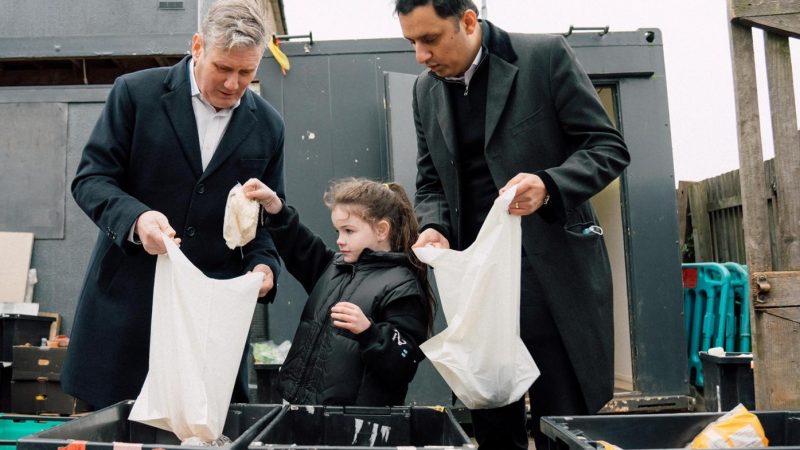
The summer recess is often known as ‘silly season’, but this summer has felt particularly stupid. Around a year out from a general election, and the government have spent their recess relentlessly focused on issues that don’t impact the lives of ordinary people.
We have had a week dedicated to small boats, endless stories about ‘eco activists’ and the new obsession: ULEZ. Meanwhile the cost-of-living crisis continues to hammer family finances, and the NHS is on its knees.
The extent of the disconnect has been laid bare by a new report from the Stop the Squeeze campaign, a coalition of civil society organisations, including Community union, campaigning for structural solutions to the cost-of-living crisis. The report, based on polling by YouGov, uses a segmentation analysis to pinpoint the views of crucial swing voters.
The NHS and the cost-of-living crisis remain voters’ top priorities
It finds that the NHS and the cost-of-living remain the two dominant issues for voters, and a key group of younger, economically insecure, swing voters value these topics far above all else. Unsurprisingly, the public have noticed the government’s desire to avoid talking about these issues – neither feature in the top two issues voters believe the government is focused on.
From a Labour point of view, there is much to be encouraged by. Labour enjoys a healthy lead on tackling the cost-of-living crisis with four in ten (40%) voters saying they think Labour would do a better job than the Tories who have the confidence of just two in ten (21%). Similarly, the party’s message on restoring economic security is resonating with voters, beating Conservative messaging among all the important voter groups.
Labour has done a great job in recent months of accurately attributing the blame for the crisis squarely at the door of the Conservatives, and that shows in the dire polling numbers for the government. But there is no room for complacency.
Voters aren’t clear what Labour will do to improve things
Labour should be wary of the fact that three-quarters of those who back Labour on the cost of living say they aren’t clear what the party would actually do to solve the crisis, and only one in ten (11%) 2019 Conservative voters prefer Labour on this issue, with 37% picking neither party. The Conservatives are definitely losing the argument on the cost of living, but to win it, Labour needs to articulate a vision of what comes next.
The Uxbridge by-election speaks to this vulnerability. The Conservative attacks on ULEZ attempted to position Labour as hurting the pockets of working people.
They had success with this strategy because they framed the debate about the fundamental issue that will define the next election: the cost-of-living crisis. This is why Labour should continue to highlight how vital the issue of economic security is and clearly demonstrate that people will be better off under a Labour government.
Of course, setting out more policy comes with its own risks, but the Stop the Squeeze research suggests that the rewards can be worth the trade off. The research found that there is support for bolder cost of living policies such as action to reduce energy bills, higher minimum wage and social security payments and greater taxes on the wealthy.
Bolder cost of living strategies could win votes for Labour
Combined with its successful critique of Tory economic mismanagement, this could deliver a 13-point swing towards Labour amongst crucial groups of voters, without losing the party substantial support elsewhere.
One critical issue within the research is energy bills, a problem that will only get worse as the weather gets colder and families start making calculations about when to turn the boiler on. The report also found the second priority of the key economically insecure swing voter group after fuel costs was raising the minimum wage, slightly ahead of action on rents and mortgages.
Compared to intervention against rising costs, tax cuts are not a vote winner. Income tax cuts came sixth in the priority list for reducing the cost of living, and parties would be better off focusing their energy and resources elsewhere when talking to voters.
Plurality believes the wealthy must pay more in taxes
When it comes to the critical question of how to foot the bill for all this, all demographic groups are united in believing that cost-of-living support should be funded by increased taxation of the wealthy, with this option receiving over 50% support among every single voter segment except the rural, heartland Conservative voters.
The cost-of-living strategy pursued by Labour has worked so far, focusing on government economic failures and leading the debate with popular interventions such as the windfall tax and the energy price freeze which were copied by the government.
While the groundwork has been laid, the focus now needs to be on developing a clear enough sense of how a vote for Labour would actually put pounds back in people’s pockets.
As the election approaches and the Tories focus on culture wars and creating debates about how to tackle climate change, this research shows Labour has a real route to power. With a clear policy offer, focused on tackling rising energy bills and housing costs, as well as raising the minimum wage, and funded by taxation of the truly wealthy, Labour will firmly place itself as the party of economic security, and that is what voters want.




More from LabourList
‘Energy efficiency changes must work for older private renters’
‘Labour’s creative destruction dilemma’
Economic stability for an uncertain world: Spring Statement 2026